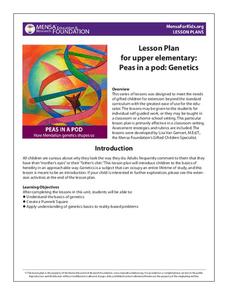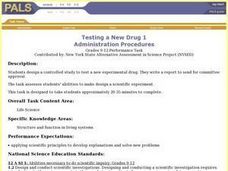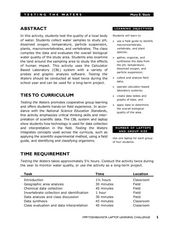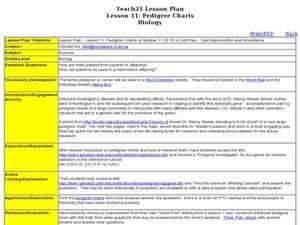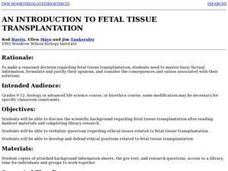MENSA Education & Research Foundation
Peas in a Pod: Genetics
Can peas have grandparents? Learn about inherited traits and heredity with a set of activities focused on Mendelian genetics. As your class learns about the process of passing traits along in Punnett squares, they take on the role of...
Curated OER
Testing the Waters
Eleventh graders examine a local body of water. For this science lesson, 11th graders collect water samples to test. Students analyze the data and make conclusions. Students create tables and graphs of the data.
Curated OER
The Artemia Hatchery
High schoolers, in groups, develop their hatcheries, working cooperatively in its design and construction. The lessons begin with the introduction to Artemia as a primary food source of many aquaculture species during their larval stages.
Curated OER
Design Your Own Biological Experiment
Students work together to research a topic of interest to them. They form hypothesis and complete experiments testing them. They present their findings to the class.
Curated OER
Fishy Behavior
Here's a lab that may make you rethink that morning cup of coffee. Biology scholars test the effects of caffeine, alcohol, and nicotine on the behavior of zebrafish through an intriguing experiment. Learners observe fish behavior before...
Curated OER
Testing a New Drug 1
High schoolers act as chief research scientists with the responsibility of testing a new drug. Students design a controlled experiment to test a hypothetical experimental drug. High schoolers write a clear, concise, and detailed plan to...
Curated OER
Using Blood Tests to Identify Babies and Criminals
Students solve a crime by matching a suspect's blood type to physical evidence collected at the crime scene. In this forensic science lesson, students identify the different blood types. They explain how blood tests work.
Curated OER
Great Lakes Ecology
Students are able to use a secchi disk to measure the turbidity of water by determining the depth at which the sechi disk is no longer visible and using the data in a formula to quantify the results. They are able to use Vernier probes...
Curated OER
For the Birds
Second graders explore biology by creating birdhouses. In this bird identification lesson, 2nd graders discuss the different types of birds that live in their environment and what characteristics each type of bird has. Students create a...
Curated OER
Science Lessons for Grade 8
Eighth graders identify the symptoms and causes of diabetes. In this biology lesson plan, 8th graders demonstrate how urine testing is used to diagnose illness. They explain why some metals are more reactive than others.
Curated OER
Comparison of Normal vs Mutant Zebra Fish Embryos
Students observe and study mutations. In this mutations lesson, students work in groups to complete observation tables of various mutations of the zebra fish embryos. Groups give presentations about their observations.
Curated OER
Testing the Waters
Students explore water in depth through discussion, research, and experiment. Students apply map skills to locating particular regions of the world as they relate to water. Students predict water quality based on information researched...
Curated OER
Seeds of Wetland Life
Students participate in several activities on seed exploration. In this biology instructional activity, students classify seeds according to their dispersal method. They explain the different adaptations plant have to disperse their seeds.
Curated OER
Pedigree Charts
Students explain how offspring inherit traits from their parents. In this biology instructional activity, students investigate the genes for nicotine addiction using an interactive website. They construct a fictional pedigree using their...
Curated OER
Recycling: The Way to Save...Fad or Fact
Young scholars write stories about recycling and illustrate them. They examine various containers and determine whether or not they are recyclable. They make a chart about the containers and visit a recycling center.
Curated OER
An Introduction to Fetel Tissue Transplantation
Students explore fetal tissue transplantation. They research basic factual information and justify their opinions. They write a paper discussing their position. Students consider the consequences and values associated with their...
NASA
Producers Make Their Own Food
During an inquiry-based lesson, scholars decide which variable to test and then design an experiment to determine the needs of producers. After two weeks, they complete a full analysis and research paper.
Curated OER
Pharmaceuticals and Treatments
Students perform an experiment involving reverse transcriptase-polymerized chain reaction HIV replication to better examine the biotechnology used by scientists in pharmaceutical research of infections diseases like HIV. Students examine...
Curated OER
How Do We Generate a Large Amount of a Specific DNA Sample?
Learners investigate the Polymerase Chain Reaction technique that is used to create larger amounts of a gene. They watch and discuss a PowerPoint presentation, explore a website, and write a report listing the materials needed to...
Curated OER
Module #1
Students explore and can explain genetic diseases, and how the central dogma plays a key role in genetic diseases. They comprehend what DNA probe is and how it is created and that there is an ethical component to biotechnology.
Curated OER
The Good and Bad Bacteria
Students are able to name one kind of harmful bacteria and why it hurts us and also name one kind of helpful bacteria and how we use it. They describe the process of growing bacterial cultures in a lab. Students create a reasonable...
Curated OER
DNA Fingerprinting: You Be the Judge!
Students use their knowledge of DNA fingerprinting to evaluate the use fingerprints in courts, and will address the ethics of establishing a national database of fingerprints.
Curated OER
Catalase Enzyme
Learners design and conduct an experiment to test their ideas about how to speed up or slow down the rate of an enzyme-catalyzed reaction. They have access to an array of physical and chemical factors that might influence enzyme...
Curated OER
Toxicants and California Blackworms
Students determine the normal behavior of California blackworms. They determine how various concentrations of assigned toxicants affect the worm's behavior. Students are introduced to testing of potential toxicants, an important...


